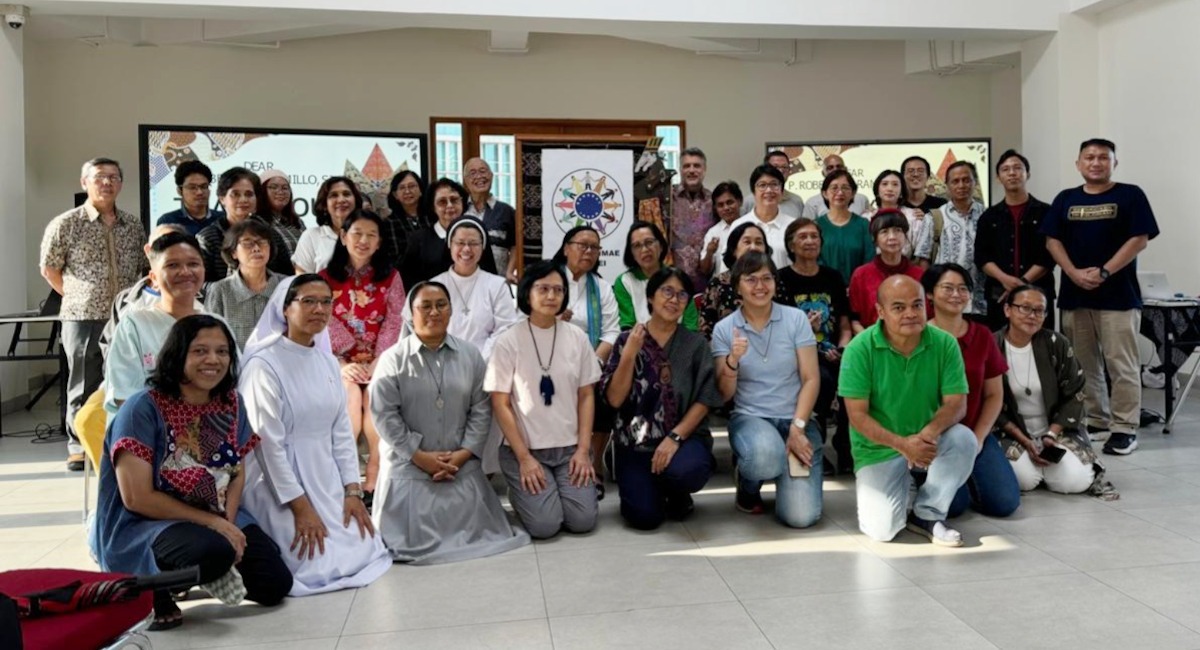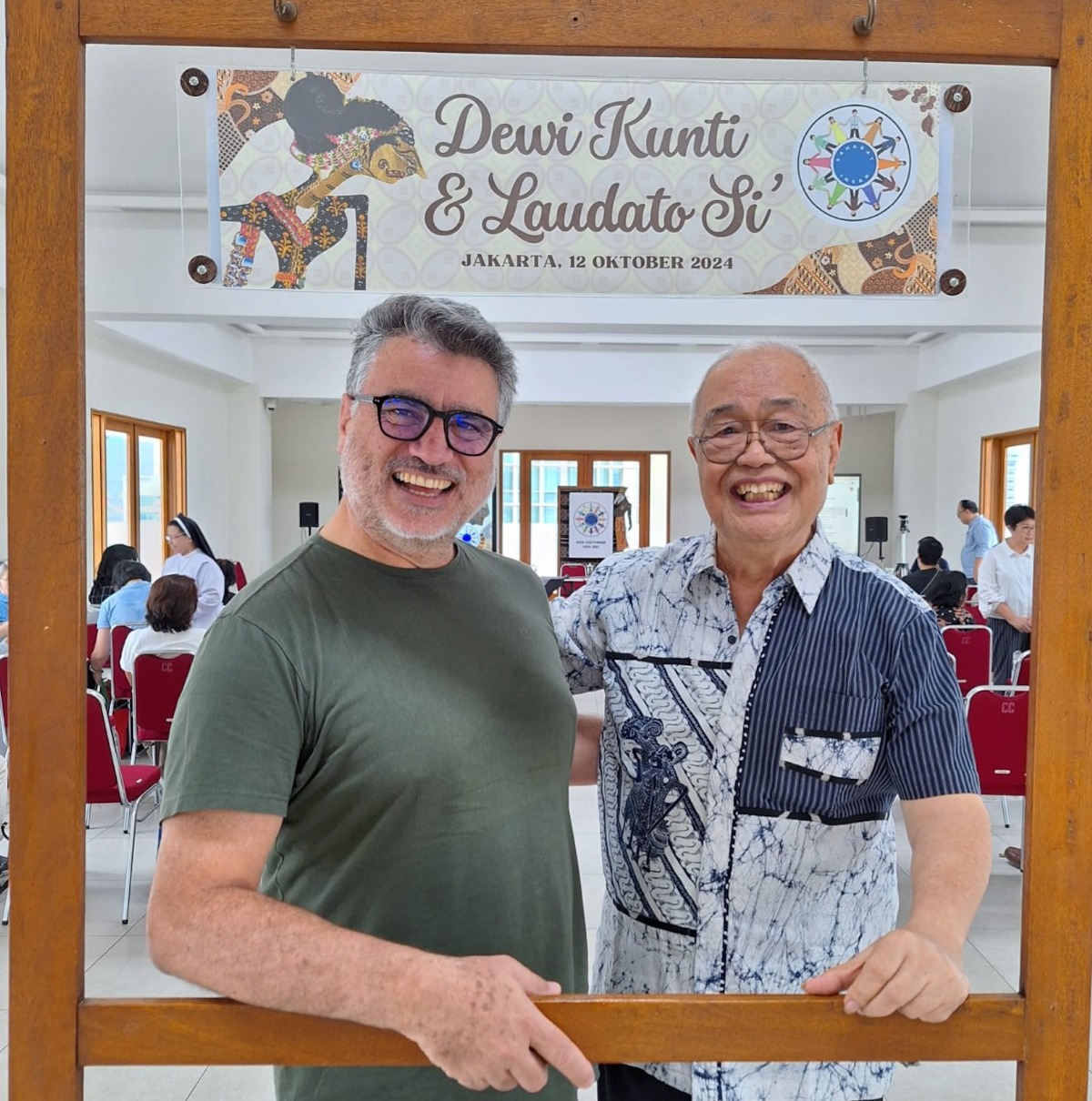
Sharing insights on Indonesian culture, Fr Ignatius Ismartono SJ, Director of Sahabat Insan, elaborated on the virtues of the puppet figure Dewi Kunti from the epic Mahabharata. The epic offers valuable teachings on environmental protection, focusing on the sanctity of nature, the balance between human needs and ecological health, and the consequences of environmental exploitation. It promotes the idea that protecting nature is an integral part of living a righteous life (dharma) and encourages sustainable interaction with the natural world.

SJES Secretary Fr Roberto Jaramillo SJ and Sahabat Insan Director Fr Ignatius Ismartono SJ
Fr Ismartono also highlighted Kunti’s compassion, responsibility, wisdom, and resilience, which serve as symbolic lessons for environmental protection. Through her teachings to the Pandavas (sons) and her connection to elemental forces, she represents a figure who indirectly upholds the values of living in harmony with nature, making her a significant character in the broader context of environmental ethics. Her virtues resonate deeply with the seven theological and cardinal virtues. This affinity provides local people with additional motivation, both cultural and religious, to care for our common home.
In turn, Fr Jaramillo outlined five attitudes necessary for embracing integral ecology:
- Going beyond environmentalism: Embracing an integral ecological attitude means addressing the root causes of the problem. These include the ideas and representations that have enabled the exploitation of nature and led to the destruction of the world, such as the belief in the possibility of constant and unlimited economic growth and the assumption that technology and growth will solve all problems.
- Adopting a new vision of the world: The traditional view conceives people and society as an agglomeration of objects and not as a community of living beings. However, ecological sciences have given us a different view, showing us that all living beings on this planet are members of the same unique family, rather than separate, independent entities that share only external appearances.
- Adopting a new vision of ourselves: Instead of seeing humans as “infinitely superior beings with the right of absolute dominion over everything on Earth,” we must recognise ourselves as united with the Earth and view all of creation as a “community of life”.
- Experiencing a new spirituality: Ecospirituality teaches that we are part of nature, fostering a sense of non-dual communion, where the spiritual and material worlds are intertwined. This spirituality creates a sense of belonging to Nature, the Earth, Life, the Universe, the Mysterious Whole.
- Caring for our common home: Abandon the current model of civilisation entirely focused on economic growth at the expense of life. This calls for a radical transformation of our energy patterns and production systems, moving away from fossil fuels.
Practising integral ecology means implementing a new economic system that functions in harmony with the conservation and growth of the community of life and the good living of humanity with Mother Earth. There is no need to withdraw from the world (quite the contrary!) or to undergo a complicated initiation process. This transformation is within reach for anyone who puts their hands to work.
Fr Jaramillo offered practical tips on how to change our lifestyles to live well and in harmony with Mother Earth:
- Live austerely, without unnecessary luxuries or standards of living that are offensive to most of the world’s population, who live in poverty. Eradicate consumerism by purchasing only what is necessary and avoiding the urge to buy the latest model. Reduce unnecessary comforts and instead invest in ecological causes.
- Use less hot water.
- Waste zero food and say no to an obsessive meat-based diet.
- Turn off unnecessary lights, avoid using appliances on standby, and only buy new appliances when necessary.
- Follow the ‘Five Rs’: Reuse, Reduce, Repair, Recycle, and Regulate.
- Think of this not just as an “ecological reconversion” but also as a “cultural revolution”: Everything must change, as it is the only way forward.
During the dialogue, there was discussion on the challenge of balancing personal efforts with the larger, often disheartening global issues. For example, at Sahabat Insan waste is well managed and plastic is starting to be avoided, but suddenly a bomb is dropped in Ukraine and Palestine. It seems as though those small actions are in vain. But Fr Jaramillo reminded the group that even seemingly small actions could contribute to global ecological balance.
This “ecological reconversion,” he said, requires the transformation of our lifestyles, mentality, even our spirituality. By embracing this integral approach, humanity will be able to “return to our Common Home, to Nature, from which we unduly exiled ourselves at some point in the past”.







